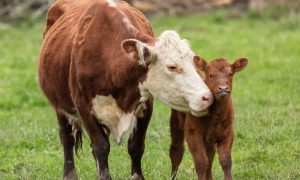We’ve made an enormous mess of our environment and we need to fix it immediately. Scientists have advised us that consuming less meat and dairy will dramatically reduce the gases emitted by farm animals and will deescalate global warming. Some governments are instructing their citizens to eat less meat and dairy. Unfortunately, the United States and many others have not yet embraced the trend. However, the increasing number of countries proactively working to decrease methane and other emissions from farm animals is very encouraging. Australia, Brazil, Qatar, Germany, Holland, and Sweden are supporting sustainability.
In 2009 Sweden was the first country to instruct its citizens to eliminate a portion of meat and dairy from their diets. The Netherlands told their citizens recently to reduce their consumption of meat to twice a week and fish once a week. The United Kingdom directed its population to replace several servings of animal protein with plant-based protein. It suggested having pulses (lentils, peas, and beans) for protein instead. The guidelines also recommend a seven-percent reduction of dairy. Estonia and France are also promoting sustainability via dietary changes. This is the beginning of a much needed and welcome paradigm shift.
Sadly, politics are preventing the United States from providing nutrition guidelines that would lead to healthier people and a less-damaged environment. The meat industry is creating an obstruction on the path to sustainability. There’s much money made in the meat industry and they insist that only animal flesh and by-products are good sources of protein. Their propaganda is beyond dangerous as this is a critical time to cut gas emissions. The beef industry makes $95 billion a year, according to the USDA. The North American Meat Institute (NAMI) reports that the meat industry sells $894 billion of flesh each year. The American Meat Institute and the National Cattlemen’s Association lobby the decision-makers in Washington to keep their industry thriving and protected against bothersome legislation.
According to the BBC, the lack of dietary rules can also be attributed to governments fearing that voters will react badly to any laws attacking their personal choices. Also, public awareness of eating habits affecting climate change is low.
Factory farms produce fifteen percent of global emissions. That’s equivalent to the exhaust emissions from all the vehicles in the entire world. Changing to healthier patterns of meat consumption could reduce emissions by seventy-five percent. Developed nations, naturally, consume the most meat, and the most resources in general.
The Paris Climate Agreement is the first worldwide attempt to address global warming. Representatives from 195 countries gathered in September of 2015 to develop a plan to reduce gas emissions, and will report back every five years to discuss their progress. This accountability will hopefully force countries to take action in a timely manner.
Eliminating factory animal farms can also terminate worldwide starvation. There are over nine million humans without enough to eat, yet more than seventy percent of grain in the United States is fed to farm animals. Directing the grain to those without enough food would feed those hungry people. Farm animals also drink copious amounts of water. The amount of water needed to produce one pound of beef is 1,799 gallons. The world population is rising and we need to feed more people with limited resources. There are seven billion of us and the number continues to increase.
Reducing meat and dairy consumption–and hopefully eliminating it completely– improves human health, decreases the production of gases that destroy our environment, and ultimately would end farm animal cruelty if factory farms close down. Moreover, we can eliminate starvation by feeding people in poor and developing countries the grain that farm animals are consuming. Hopefully the countries that are not endorsing the dietary changes will do so soon, before it’s too late.






